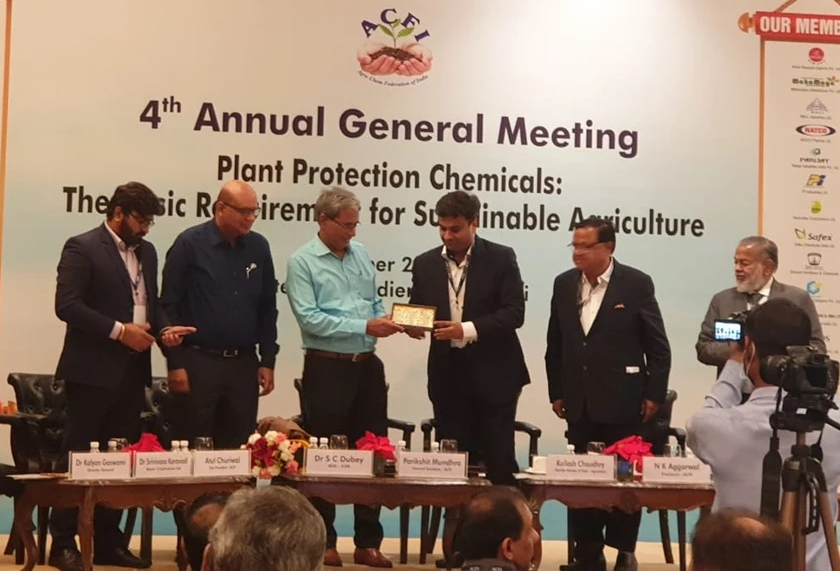The Bill doesn’t address the issue of bringing newer and better molecules in India.

The government is working towards the Central Insecticides Board & Registration Committee (CIBRC) reforms and ease of doing registration, said Dr. S K Malhotra, Agriculture Commissioner & Chairman, Registration Committee, Ministry of Agriculture and Farmers Welfare, at 4th AGM of Agrochem Federation of India (ACFI).
Malhotra also expressed concern about the unorganised pesticide industry and hoped the industry body will work towards making it organised one.
The Association organized a brainstorming technical discussion on ‘Plant Protection Chemicals: The basic requirement for Sustainable Agriculture’.
Speaking on the occasion, Dr. S C Dubey, ADG, ICAR, Ministry of Agriculture and Farmers Welfare, emphasised on indigenous new molecules, setting up of R&D and data protection to encourage new technologies.
NK Aggarwal, Outgoing President of ACFI, urged the Government to extend support for the uncomplicated registration process and bring modification in the Pesticide Management bill. He also expressed upon the need for skill development and enhancing awareness of the farmers, dealers and distributors.
He reiterated on the shortcomings of Pesticide Management bill. The Pesticide Management Bill (PMB) - 2020 was introduced in Rajya Sabha by the Minister of Agriculture and Farmers Welfare, Narendra Singh Tomar, on March 23, 2020 and later it was referred to the Standing Committee on June 3, 2021.
Pesticide Management Bill (PMB) 2020 NEEDS TO ADDRESS THE SHORTCOMINGS OF INSECTICIDE ACT
The 2020 Bill does not specify a time limit for registration. To ensure speedy registration, transparency and efficiency in the functioning of the Registration Committee, the registration must be granted within one year of application.
PMB-2020 does not talk about the serious problems of the grants of thousands of ghost registrations and hundreds of licenses, increasing complaints against pesticides quality by farmers, poor quality control enforcement.
It doesn’t address the issue of bringing newer and better molecules in India.
Regulatory Data Protection is one of the biggest concerns of the Agro Chemical industry. But it has not been included in PMB 2020. Registration of a new pesticide requires the applicant to submit safety and efficacy data generated over a number of years. Data protection will ensure that the data generated would not be relied upon to grant registration for the same pesticide to any other person for a specified time. To be a global hub of Agro Chemicals India must offer a globally acceptable and an enabling business environment, to encourage molecule discoverers to bring maximum possible molecules to benefit Indian farmers, and with growing volumes even manufacture them in India.
PMB-2020 suggests that higher punishments alone will ensure quality products. Whereas it should ensure that only responsible persons with the ability to adequately invest in both safety and efficacy are allowed to obtain registrations and get manufacturing licenses so that the farmers will get only the genuine products. Both under the existing Act & proposed bill no qualifications are required to obtain a registration which makes obtaining a manufacturing license from the State very simple. This is evident by the fact that there are more than 4000 firms that have been granted over 150,000 (one lakh fifty thousand) registrations.
PMB-2020 does not prescribe the minimum standards required for the Central Insecticides Laboratory and the State Pesticides Testing Laboratories, which presently is a huge deterrent to quality enforcement.
CIBRC Reforms:
Six Associations, ACFI, CLI, CII, HICA, PHDCCI & FICCI are working together for the CIBRC reforms. The main objective is revamping of infrastructure of government testing Laboratories, Regulatory data protection, outsourcing of Chemical & Toxicological tests.
States Banning Glyphosate on Flimsy grounds:
The state government of Andhra Pradesh, Telangana, Punjab banned Glyphosate. Under the Section 27of Insecticide act 1968, the government is only permitted to ban any product for2 Months that can be extended foranother30 Days. ACFI has taken up this issue in the Hon’ble High Court of Hyderabad and got the favourable decision and will be following the same course of action in other states.
Restricted use of Glyphosate through PCO’s only:
A draft order issued by the Ministry of Agriculture and Farmers Welfare, called “Restriction on Use of Glyphosate Order, 2020”, dated 6 July, 2020, published in the Gazette of India vide notification dated 7 July, 2020”, states that the government wants to see that the application of glyphosate and its products being taken up by qualified people such as PCOs for its justified use. ACFI is actively laisoning with the Department suggesting that the matter pertaining to Draft Order should be investigated properly in accordance with the law and scientific reasoning, as this order will have adverse effects not only on the industry but the farmers too.
Subscribe to our newsletter & stay updated.